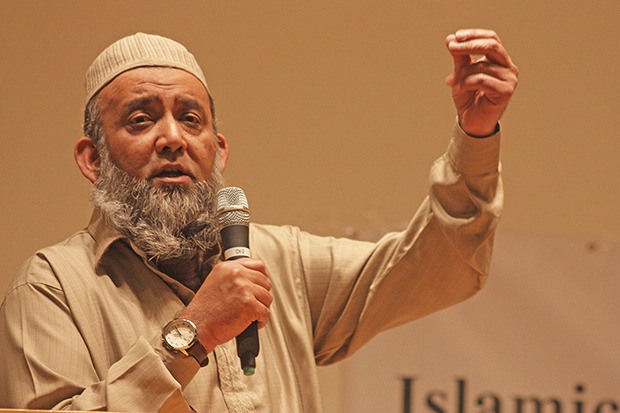Know your neighbor.
Extending a hand and ear, Suzette Cooke made the conscientious effort.
Kent’s mayor soon discovered that the family next door had escaped the horrors of war-ravaged Iraq, that assassins had killed the father because he was a professor, that a backyard bombing had blown out one of the oldest child’s eyes.
They’ve since become warmhearted friends.
“I find it alarming to read about people within my country who, because of their lack of knowledge, are so opposed to Muslims being in this country,” Cooke told an audience at an Islamic Center of Kent-sponsored seminar that addressed Islamic-Christian relations last Saturday. “(Muslims) are afraid and only hear and remember the bad … the acts of individuals who claim that it is in the name Allah that they do atrocities around the world.”
Cooke’s new-found neighbors have deepened her understanding of Muslims, giving her acceptance and respect for a faith that binds together billions of people in many nations throughout the world and for a religion that transcends many generations.
It is misunderstandings, misconceptions and ignorance that have opened and maintained a chasm, and stoked fear between Islamic and Christian communities, near and far. That was the prevailing view as Islamic leaders, city leaders and local residents met to discuss those relationships in an open house at the Kent Senior Center.
The purpose of the seminar was to better understand Islam, dispel myths about the faith, engage in a lively discussion about its teachings and the media’s portrayal of it and achieve a common understanding.
The Islamic Center of Kent serves more than 500 Muslim families in the Kent, Auburn, Renton and Federal Way area. The families come from a wide range of ethnic backgrounds, including Middle Eastern, Somalis, African-Americans, Afghan, Pakistani, Turkish, Fiji and Indian, among others.
Talks are vital
“It’s important to have these conversations, to learn from those who practice, to find commonalities and to recognize differences,” Cooke said. “I’m surprised, as I learn about Islam, how much it parallels how I’ve grown up in a Christian home.”
Sheikh Fazal Hasan, an imam (leader) at the Islamic Center of Bellevue, was born in South Africa and grew up in the apartheid era.
“It is because of ignorance, not knowing the other side, we don’t respect and appreciate one another,” Hasan said of today’s faith-based divisiveness in society. “As human beings, God has challenged us … that you need to educate yourself. You need to find out what is right and what is wrong.
“Everybody cannot be a Muslim, a Jew, a Christian, but as human beings, we can live together,” he said. “We need to learn to live with one another and respect one another.”
Local Islamic leaders contend today’s mainstream media provides a mostly negative portrayal of Islam and Muslims, depicting them generally as violent, fanatical, bigoted or as extremists and terrorists. Islamophobia, the fear of Islam and Muslims, is prevalent today, they say.
The portrayal of Arab and Muslim people in Western media is “typically stereotypical and negative,” according to a recent study of perceptions of Islam. The report, commissioned by the Kuwaiti government and based on surveys and interviews with media experts, claims that terrorism, anti-Americanism, and the Iraq occupation dominate TV news coverage of the Middle East.
“There is so much propaganda, so much wrong being portrayed out there,” Hasan said. “There are Muslims who are misrepresenting Islam … and the media perpetuates it, calling them terrorists, those wanting to kill.”
Cooke concurred.
“I am angry at the media for distorting what could be positive conversations about the good connected to those who practice Islam. I am disappointed in the people who choose to listen and believe in the horror stories and do the broad paintbrush over all,” Cooke added. “Today each of us … has a responsibility and a calling to help make sure that our community of Kent rises above that, as we are armed with information, as we expand our contacts of people who are living their faiths. We then owe it to our neighbors, to the children, to our community, to help set the record straight.”
As Sheikh Joban, a native Indonesian and a member of the Muslim Association of Puget Sound, said, Islam remains one of the “most misunderstood” religions in the world. He added that Muslims by nature are peaceful, purposeful people.
“Islam means peace, submission, a total surrender of oneself to God,” Joban said.
Yahya Malik, a native Pakistanian, moved to the U.S. in 1962 and found a home in Kent, a community that has since embraced him and his family. It is where his children and grandchildren were born. It is where he has become a successful senior vice president and co-founder of a technology company.
He hasn’t encountered any hostility because of his race or religion. But since America’s declared war on terrorism, Muslims have become targets, he said. More work needs to be done to soothe relationships.
“I believe the Muslims need to educate others as to what Islam really is,” Malik said. “People, young and old, need to know the truth. At the moment, the only source they have is the media and the politicians who are saying whatever would help them to achieve their own objectives.
“What I am trying to say is: the Muslim communities … must take (an) active part in educating others to build bridges with other communities and have safe and peaceful cities and neighborhoods.”
BELOW:
Kent Mayor Suzette Cooke talks to the audience at the seminar.
MARK KLAAS, Kent Reporter

Talk to us
Please share your story tips by emailing editor@kentreporter.com.
To share your opinion for publication, submit a letter through our website https://www.kentreporter.com/submit-letter/. Include your name, address and daytime phone number. (We’ll only publish your name and hometown.) Please keep letters to 300 words or less.
